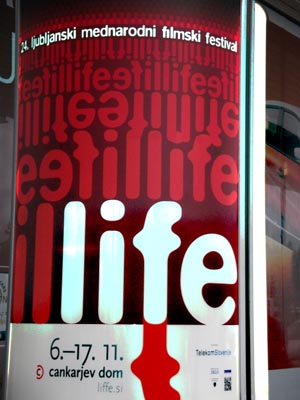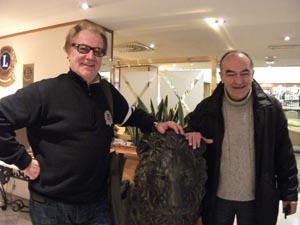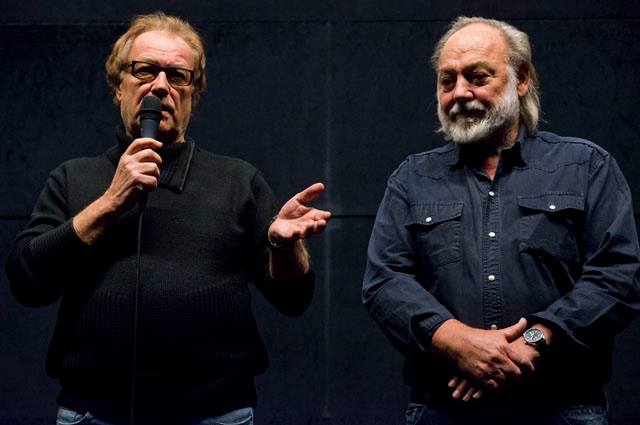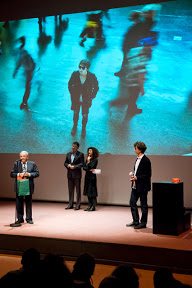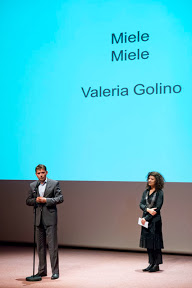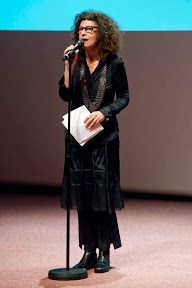|
|
||
|
Pro Tools
FILMFESTIVALS | 24/7 world wide coverageWelcome ! Enjoy the best of both worlds: Film & Festival News, exploring the best of the film festivals community. Launched in 1995, relentlessly connecting films to festivals, documenting and promoting festivals worldwide. Working on an upgrade soon. For collaboration, editorial contributions, or publicity, please send us an email here. User login |
Zagreb Film Festival Golden Pram for RumbaOn 6th Zagreb Film Festival (www.zagrebfilmfestival.com) on the merit of this years Jury (Marit Kapla-Director of the Goteborg Film Festival, Sejla Kameric-film director and Nadine Luque-film producer) this year’s programme for feature and shorts offered hilarious Belgian Chaplin style feature “Rumba”. This film won The Golden Pram Award for Best Feature Film and it is directed by Dominique Abel, Fiona Gordon and Bruno Romy. It’s a choreographic and physical movement film that resembles great deal an old silent movie of C.Chaplin and B. Keaton. Basically it’s a comedy with psychology and very little talk, all in situation and none of naturalism, but in these days such an original and optimistic storytelling.
Main actors Dominique and Fiona dancing Latino dance routines but express in comic mime and agile body movements. Some visual gags also recall the finesse of Jacques Tati or Mr. Bean. It turns a dark tragedy into a theatrical comedy through a series of surreal gags. This is strictly visual material, with precise pop-art compositions, in between the minimalism and the colourful designs, that reflects a modernist comic sensibility.
1. You have lots of theatre in your film ‘Rumba’ why? Dominique: We have been doing a lot of things in our theatre. We did a lot of theatre in the past. And we want to do theatre in the cinema. In the beginning of cinema there were lot of theatre style in, in the beginning of cinema there were many different styles, but somewhere on the line, naturalistic theatre took over. But at the beginning of a cinema a lot of people did came from theatre, B. Keaton, C. Chaplin etc… they all brought their own universe into cinema from the theatre. There’s lots of imagine here, lot of work, they found their own style in cinema. We had a similar voyage; we didn’t want to eliminate a theatre vocabulary, but to adapt to the cinema vocabulary. We wanted to use what we know in the theatre in our film.
2. Did you use a script? Fiona: We had the script but when we started to shoot, we started to rewrite and most of the writing came from improvisations. But we usually start with structure of lets say 40 pages, where we describe exactly what we are going to do, to adjust the back and then when we have back, we start to reverse and to use objects. We had chairs, books, boxes and we had digital camera and we shot us. And that’s where we have got the material for the film really. Visually we wanted to see what everyone say and do. And, that is the only way to write our dialogue.
Dominique: Lots of people ask why we screen this way, why we bring theatre in. When we reversed we tried a lot of thing, we reverse this, we reverse that, and we usually come back with table camera, because we like to see the way the bodies are in relation with each other. Once you start doing you got to have lots of parameters that influence the rhythm of the scene. And for us its important that we will be actors and that our emotions go from A to B without interrupting
3. How did the audience react? Fiona: The audience does accept work with lot more difficulties. Because they are 140 secrets shots in this film. There are only few almost non close ups. In certain countries we done really very well, but in France we did terrible …
Dominique: …In some countries people accept harder this sort of film. Most people look for psychology and dialogue in films and they have to figure out that we don’t do this sort of cinema. When you go to see new theatre or circus you are ready for anything, you are ready for minimalism, for anything really. So we have to reach people with same sense of humour and expressions.
Fiona: Even in comedy, sometimes there are preconceptions that comedy has to be without gags, but our sort of comedy is not so much what we do, but how we do it. It’s not about having the rhythm of American comedy.
Dominique; When we travelled in America we had one copy of the film, and this copy still circulating for 2 years, not just because people love theatre…Its not about what we do but how we do the comic acts. We take a camera in our hands and do the colours ourselves.
Fiona: We influenced not only the actors’ play but basically we are editing, writing, doing everything. We took over the whole media and didn’t want to have other people around. What we have here is just a tip of the iceberg, we don’t resist dialogue, but movement dominates our work.
4. Where were you accepted the best? Dominique: It depends where you are. In France were taken very good and in Belgian they think our work is very English. But I think in our work we have Jacques Tati, not lot of people are doing that. We have few countries who like us lots. But our sort of work do not coming from the particular country. In America this is B. Keaton and C. Chaplin influence, in other countries there are other people known by this expression, but not known to others.
5. So this is theatre in a frame of cinema? Dominique: Yes we are out of naturalism we like to look ourselves as two clowns and we have to pick colourful background and compare our work with the paintings and we like to do surprises…
6. New project? Fiona: We have about 40 pages written and soon we going to have to start improvising what works and what doesn’t.
7. What about the money for the film?Dominique: We have Belgian Art Council and we have French Art Council, a little bit from the TV, but we don’t ask for much money and we are happy with what we can get. We know we have to adapt to low budget. We can’t ask lots of money because in our films we have almost no dialogue, no psychology, and our money funding takes time, because we relay on little budget and same sources, so that they can trust us. 02.11.2008 | Radmila Djurica's blog Cat. : 6th Zagreb Film Festival America Bean Bruno Romy Dance Dominique Abel Entertainment Entertainment Film Fiona Gordon France Jacques Tati Jacques Tati MIME Mime artist Mimes Nadine Luque Nothing Pantomime Silence The Golden Pram Award The Göteborg Film Festival Theatre ZAGREB FILM FESTIVAL FESTIVALS
|
LinksThe Bulletin Board > The Bulletin Board Blog Following News Interview with IFTA Chairman (AFM)
Interview with Cannes Marche du Film Director
Filmfestivals.com dailies live coverage from > Live from India
Useful links for the indies: > Big files transfer
+ SUBSCRIBE to the weekly Newsletter Deals+ Special offers and discounts from filmfestivals.com Selected fun offers
> Bonus Casino
User imagesAbout Radmila DjuricaThe EditorUser contributions |



















